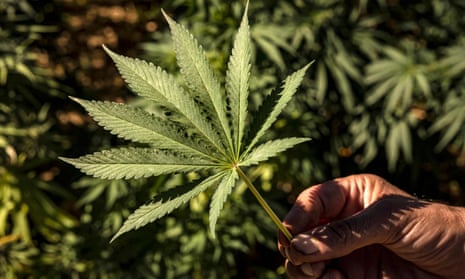Cannabis would be legal and regulated in Victoria by 2024 under a Greens proposal, being announced ahead of November’s state election, that the party says could help raise $1.21bn in revenue over 10 years.
Under the plan, costed by the independent Parliamentary Budget Office, it will be legal for Victorians aged over 18 to buy cannabis, which would be taxed at a rate of 30% of sales – largely in line with levies on alcohol.
Penalties for selling cannabis to people under 18 would also be introduced, set at double the penalty for selling alcohol to underage drinkers.
The plan, to be unveiled by the Greens’ Brunswick MP, Tim Read, on Monday, also involves decriminalising small quantities of other drugs, which could save the state an additional $250m, due to savings in the justice system.
Read said regulating the sale and consumption of cannabis would undercut the black market and reduce harm.
“This policy is a recognition that decades of prohibition has failed,” he said, noting the recent increase in the state’s prison population has been driven by low-level drug offences.
“Thousands of Victorians smoke cannabis but it’s disproportionately Aboriginal people and young people who are arrested for doing so.
“We need to be looking to use our police and prison resources more wisely, we can’t afford to keep throwing good money after bad.”
About $10m would be spent to set up a government agency to oversee and regulate the production, sale, and price of cannabis, while five years of education, prevention and awareness activities are included in the costings.
The budget office analysis takes into account the prediction that the legalisation of cannabis would cause a “sustained, annual increase in total consumption”, while the retail price would decrease over time.
Under the second component of the plan, the possession of small quantities of illicit drugs would also be decriminalised from 2023.
Instead of facing court, those found in possession of small quantities of drugs would face a body that would determine sanctions such as small fines or rehabilitation.
Read said the revenue raised from the proposed tax should be invested in drug and alcohol detox and treatment services.
The federal Greens are also ramping up their efforts to legalise cannabis ahead of a planned private member’s bill to be introduced next year, while in the US, Joe Biden recently pardoned thousands of Americans convicted of cannabis possession.
Dr Will Tregoning, chief executive of drug law reform group Unharm, said there had been a “transformation” in attitudes to cannabis use in recent years.
after newsletter promotion
“Joe Biden’s pardoning is evidence of that, but the federal election result, in which the Legalise Cannabis Party got half a million votes nationally, is another indicator of the growing support for cannabis reform across Australia,” he said.
In July, Unharm surveyed 1,000 Victorians through an online survey conducted by Community Engagement – a polling company used by Labor.
The survey asked people about their attitudes to cannabis and law reform before asking, “If a political party or candidate supported legalising cannabis, would that make you more or less likely to vote for them?”
About 40% of respondents said it would make them more likely to vote for a party or candidate, while 22% of people said it would make them less likely.
Tregoning said the poll showed cannabis law reform was a “vote-shifting issue” for Victorians.
It comes as Greens federal MP Max Chandler-Mather visited the battleground seat of Richmond at the weekend to run training sessions on the party’s successful grassroots “social work” strategy, employed in Queensland at the federal election.
“This feels a lot like Griffith,” he said of Greens candidate Gabrielle de Vietri’s campaign.
“She’s knocking on more doors than I did at the same time, which was no mean feat.”
Richmond is currently held by retiring MP and former housing minister Richard Wynne on a 5.8% margin.
